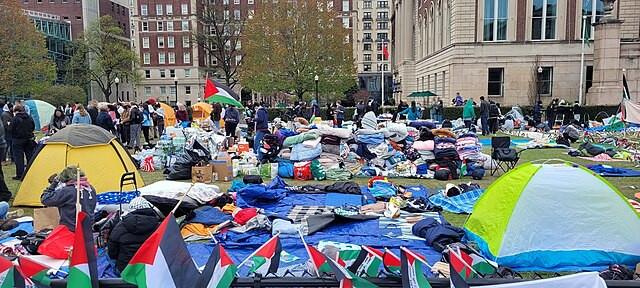In a dramatic turn of events, officers took protesters into custody late Tuesday after Columbia University called in the New York Police Department (NYPD) to end the pro-Palestinian occupation on its New York campus. The move came after demonstrators had occupied Hamilton Hall for more than 12 hours, expanding their reach from an encampment elsewhere on the grounds that had been in place for nearly two weeks.
According to a statement released by a Columbia spokesperson, the university requested police assistance after learning that Hamilton Hall had been "occupied, vandalized, and blockaded" overnight. The spokesperson said that the university was "left with no choice" after Columbia public safety personnel were forced out of the building and a facilities worker was "threatened."
"The decision to reach out to the NYPD was in response to the actions of the protesters, not the cause they are championing," the statement read. "We have made it clear that the life of campus cannot be endlessly interrupted by protesters who violate the rules and the law."
The police intervention at Columbia comes amid a wave of protests that have swept across college campuses from California to Massachusetts. As May commencement ceremonies approach, administrators are facing increased pressure to clear protesters, with more than 1,000 arrests having been made over the last two weeks in states including Texas, Utah, Virginia, North Carolina, New Mexico, Connecticut, Louisiana, California, and New Jersey.
Prior to the police arrival, New York City Mayor Eric Adams had advised the Columbia protesters to "walk away from this situation now and continue your advocacy through other means," emphasizing that the protest "must end now."
The White House also weighed in on the matter, with National Security Council spokesperson John Kirby stating that President Joe Biden believes students occupying an academic building is "absolutely the wrong approach" and "not an example of peaceful protest."
The nationwide campus protests began at Columbia in response to Israel's offensive in Gaza following a deadly attack by Hamas militants on southern Israel on Oct. 7. The attack resulted in the deaths of approximately 1,200 people, mostly civilians, and the taking of around 250 hostages. In its efforts to stamp out Hamas, Israel has killed more than 34,000 Palestinians in the Gaza Strip, according to the local health ministry.
The protests have sparked heated debate, with Israel and its supporters branding them as antisemitic, while critics of Israel argue that such allegations are used to silence opposition. Organizers of the protests, some of whom are Jewish, maintain that the movement is peaceful and aimed at defending Palestinian rights and protesting the war.
On Columbia's campus, protesters had locked arms early Tuesday and carried furniture and metal barricades to Hamilton Hall, a building that had been occupied during a 1968 civil rights and anti-Vietnam War protest. The occupying protesters have insisted that they will remain in the building until the university agrees to three demands: divestment, financial transparency, and amnesty.
The Columbia University Chapter of the American Association of University Professors has criticized the university's administration for its handling of the situation, stating that faculty's efforts to help defuse the situation have been repeatedly ignored. The group warned of potential conflict between police officers and protesters on campus, holding the university leadership responsible for any injuries that may occur during the police action.
Ilana Lewkovitch, a self-described "leftist Zionist" student at Columbia, expressed her frustration with the protests, stating that it has been difficult to concentrate on school amid calls for Zionists to die or leave campus. Lewkovitch, who identifies as Jewish and studied at Columbia's Tel Aviv campus, said she wished the pro-Palestinian protests were more open to people like her who criticize Israel's war policies but believe in the existence of an Israeli state.
The full statement from Columbia University follows here:
"A little after 9 p.m. this evening, the NYPD arrived on campus at the University's request. This decision was made to restore safety and order to our community.
We regret that protesters have chosen to escalate the situation through their actions. After the University learned overnight that Hamilton Hall had been occupied, vandalized, and blockaded, we were left with no choice. Columbia public safety personnel were forced out of the building, and a member of our facilities team was threatened. We will not risk the safety of our community or the potential for further escalation.
The leadership team, including the Board of Trustees, met throughout the night and into the early morning, consulting with security experts and law enforcement to determine the best plan to protect our students and the entire Columbia community. We made the decision, early in the morning, that this was a law enforcement matter, and that the NYPD were best positioned to determine and execute an appropriate response.
We believe that the group that broke into and occupied the building is led by individuals who are not affiliated with the University. Sadly, this dangerous decision followed more than a week of what had been productive discussions with representatives of the West Lawn encampment.
We severely curtailed the number of people on Morningside campus starting Tuesday morning. Over the course of the day, we updated our community on access to campus buildings, and will continue to do so through the next few days.
The decision to reach out to the NYPD was in response to the actions of the protesters, not the cause they are championing. We have made it clear that the life of campus cannot be endlessly interrupted by protesters who violate the rules and the law.
Early Tuesday, protesters chose to escalate to an alarming and untenable situation - including by vandalizing property, breaking doors and windows, blockading entrances, and forcing our facilities and public safety workers out - and we are responding appropriately as we have long made clear we would. The safety of our community, especially our students, remains our top priority."






